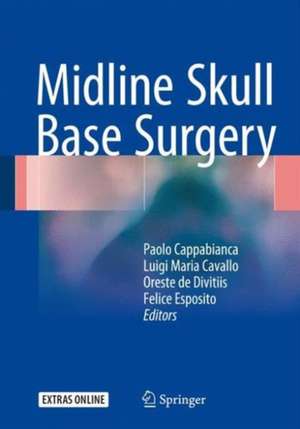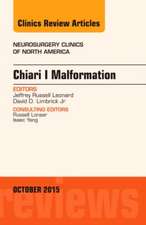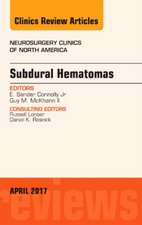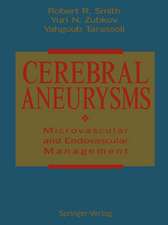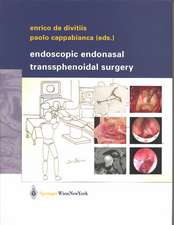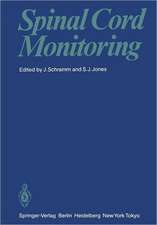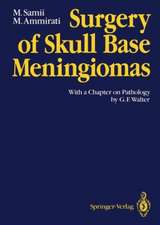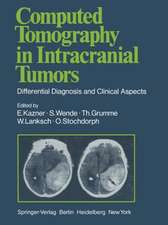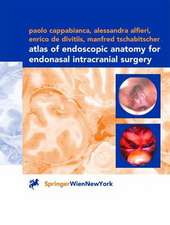Midline Skull Base Surgery
Editat de Paolo Cappabianca, Luigi Maria Cavallo, Oreste de Divitiis, Felice Espositoen Limba Engleză Hardback – 7 dec 2015
| Toate formatele și edițiile | Preț | Express |
|---|---|---|
| Paperback (1) | 789.54 lei 38-44 zile | |
| Springer International Publishing – 27 mar 2019 | 789.54 lei 38-44 zile | |
| Hardback (1) | 752.47 lei 3-5 săpt. | |
| Springer International Publishing – 7 dec 2015 | 752.47 lei 3-5 săpt. |
Preț: 752.47 lei
Preț vechi: 792.08 lei
-5% Nou
Puncte Express: 1129
Preț estimativ în valută:
143.99€ • 148.77$ • 119.78£
143.99€ • 148.77$ • 119.78£
Carte disponibilă
Livrare economică 26 februarie-12 martie
Preluare comenzi: 021 569.72.76
Specificații
ISBN-13: 9783319215327
ISBN-10: 3319215329
Pagini: 373
Ilustrații: XVIII, 373 p. 174 illus., 122 illus. in color. With online files/update.
Dimensiuni: 178 x 254 x 25 mm
Greutate: 1.33 kg
Ediția:1st ed. 2016
Editura: Springer International Publishing
Colecția Springer
Locul publicării:Cham, Switzerland
ISBN-10: 3319215329
Pagini: 373
Ilustrații: XVIII, 373 p. 174 illus., 122 illus. in color. With online files/update.
Dimensiuni: 178 x 254 x 25 mm
Greutate: 1.33 kg
Ediția:1st ed. 2016
Editura: Springer International Publishing
Colecția Springer
Locul publicării:Cham, Switzerland
Public țintă
Professional/practitionerCuprins
Preface.- Acknowledgements.- Part I Pituitary adenomas.- 1 Introduction to pituitary adenomas.- 2 Endoscopic endonasal transsphenoidal approach (standard and extended technique).- 3 Endoscopic endonasal ethmoid-pterygoid transsphenoidal approach to the cavernous sinus.- 4 Frontotemporal approach.- 5 Radiotherapy and radiosurgery.- Part II Craniopharyngiomas.- 6 Introduction to craniopharyngiomas.- 7 Endoscopic endonasal transsphenoidal approach.- 8 Frontotemporal approach.- 9 Supraorbital approach.- 10 Transcallosal approach.- 11 Radiotherapy and radiosurgery for craniopharyngiomas.- Part III Cystic sellar lesions.- 12 Introduction to cystic sellar lesions.- 13 Arachnoid cysts.- 14 Rathke cleft cyst.- Part IV Anterior cranial fossa meningiomas.- 15 Introduction to anterior cranial fossa meningiomas.- 16 Endoscopic endonasal transsphenoidal approach.- 17 Frontotemporal approach.- 18 Subfrontal approach.- 19 Supraorbital approach.- 20 Radiotherapy and radiosurgery.- Part V Clival chordomas.- 21 Introduction to clival chordomas.- 22 Endoscopic endonasal transsphenoidal approach.- 23 Retrosigmoid approach.- 24 Skull base approaches.- 25 Radiotherapy, radiosurgery and proton beam.- Part VI Cranial base reconstruction after transcranial and transnasal skull base surgery.- 26 Indications for cranial base reconstruction.- 27 Neuroradiology in cranial base reconstruction.- 28 Anatomy of cranial base reconstruction.- 29 Techniques for cranial base reconstruction.
Recenzii
“This is an excellent text/atlas on the diagnosis, treatment, complications, and management of all midline tumorous lesions encountered in neurosurgical patients. … Full color photographs including cadaver and intraoperative views are included. The structures are perfectly described and labeled. … The book is suited for residents, fellows and neurosurgeons.” (Joseph J. Grenier, Amazon.com, May, 2016)
Notă biografică
Paolo Cappabianca is Full Professor of Neurosurgery at the Università Federico II, Naples, Italy. He graduated in Medicine and Surgery and specialized in Neurosurgery, before enrolling as a visiting fellow at the Institute of Anatomy, University of Vienna. Besides being a full professor in functional neurosurgery and stereotactic surgery and chairman of the Neuroendoscopy Committee of the World Federation of Neurosurgical Societies (WFNS), he worked as an associated professor at the Department of Neurological Sciences, University of Pittsburgh Medical Center (UPMC), USA. Professor Cappabianca has been a visiting professor and guest lecturer at various U.S. universities, including the University of Virginia, Charlottesville; the University of California at Los Angeles and at San Francisco; Mount Sinai School of Medicine, New York; the University of Pittsburgh Medical Center; Harvard Medical School at Brigham & Women's Hospital, Boston; and Univerity of Pennsylvania, Philadelphia. He has delivered the Ginde Oration in Mumbai, India, and has also lectured in Canada, Egypt, Germany, Chile, and Japan.
Dr. Cappabianca is affiliated to various international societies: Società Italiana di Neurochirurgia (SINch), Associazione Italiana di Neuro-Oncologia (AINO),American Association of Neurological Surgeons (AANS), Congress of Neurological Surgeons (CNS), Society of University Neurosurgeons (SUN), the Pituitary Society,European Association of Neurological Surgery (EANS), German Society of Skull Base Surgery, European Association of Neuro-Oncology (EANO), and Sociedad de Neurocirugia de Chile. He is an editorial board member for Neurosurgery, an international advisory board member for Acta Neurochirurgica, and senior editor of the peer-review board of World Neurosurgery.
Textul de pe ultima copertă
This richly illustrated book offers detailed, step-by-step guidance on surgical approaches and techniques in patients with midline tumors of the skull base. Access routes are described from both endoscopic and microscopic standpoints, via different approaches, in order to provide a 360-degree overview of contemporary midline skull base surgery. For each pathology, the multiple surgical options and their specific indications are clearly presented, with inclusion of neuroradiological images, an anatomical dissection study, and operative images and videos. The book is intended for surgeons who wish to acquire knowledge and experience in skull base surgery employing endoscopic endonasal and microsurgical transcranial techniques. It is exceptional in providing an integrated perspective that encompasses traditional microsurgical approaches and the most recent endoscopic ones, with definition of the indications for and limitations of both options.
Caracteristici
Offers a comparative evaluation of surgical approaches (transcranial and endonasal) based on lesion type, with special focus on anatomy, neuroradiology and neurosurgical technique Identifies the indications for and limitations of each neurosurgical approach Describes the modern multidisciplinary management of skull base lesions Supported by a wealth of figures and videos for step by step procedures
